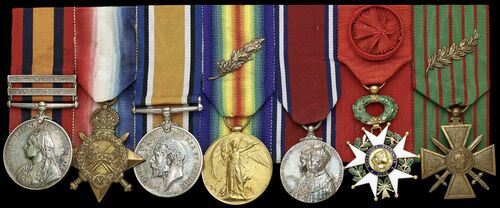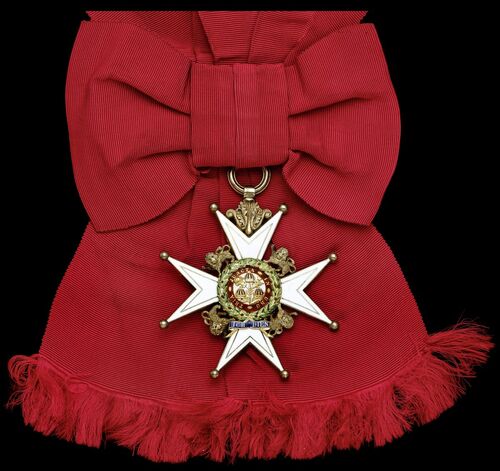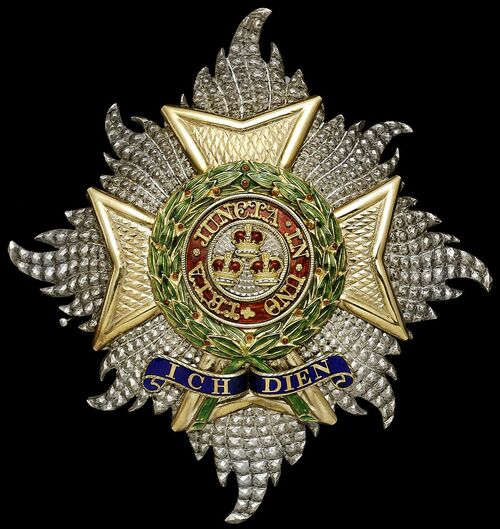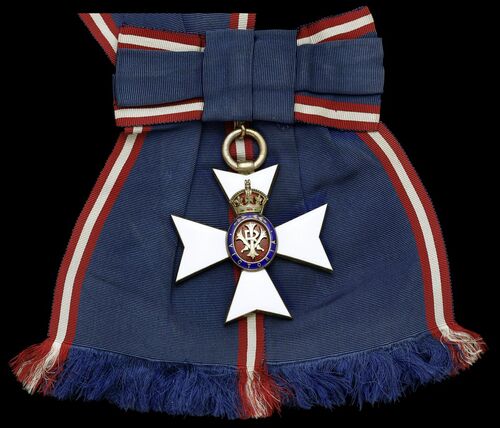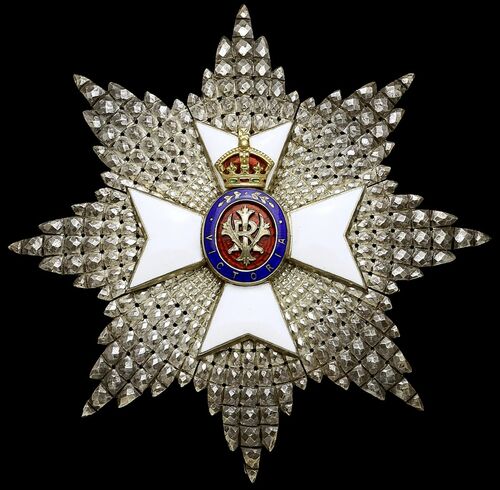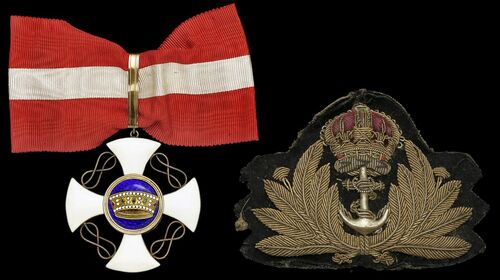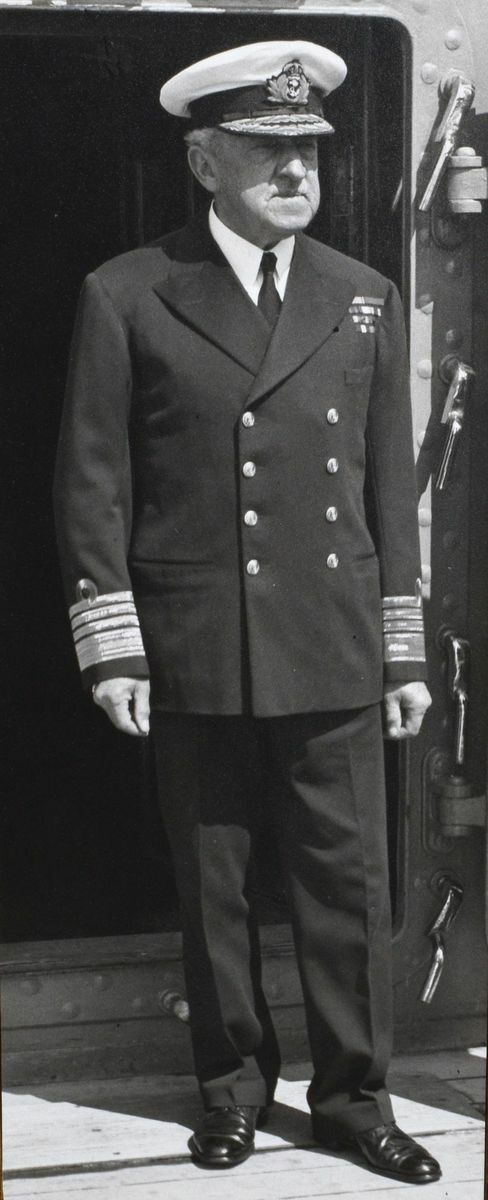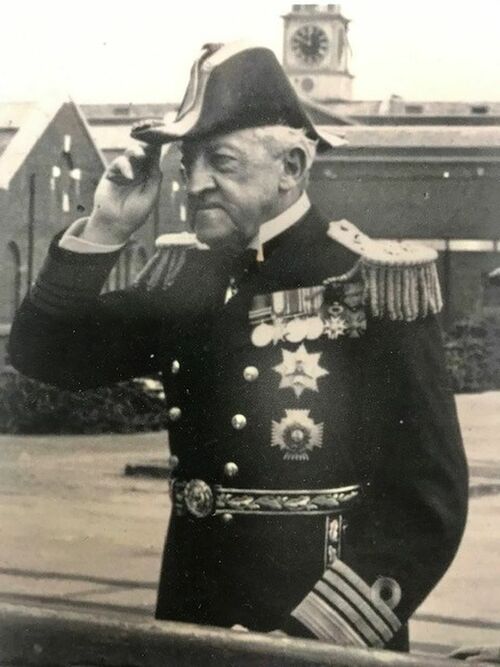Auction: 23003 - Orders, Decorations and Medals
Lot: 227
'Now that man [Kelly] – the men in the Navy trusted him. He didn’t come up the gangway and be piped aboard the same as most Admirals, he came over the boom (i.e. as a sailor would come aboard).'
So wrote a Stoker of the good Admiral.
The outstanding 1935 G.C.B., 1932 G.C.V.O. group of ten awarded to Admiral of the Fleet Sir John J. D. Kelly, Royal Navy
Kelly began the Great War with the command of the Dublin, who led the chase of the Goeben and was Second-in-Command for the Dardanelles Force during the Gallipoli Landings; he latterly led the Naval Force during the Chanak Crisis, then becoming Fourth Sea Lord, commander of the 1st Battle Squadron and also leader of the Atlantic Fleet in the aftermath of the Invergordon Mutiny
Kelly had the universal respect of The King, the high ranks at The Admiralty and those 'below decks' in equal measure and it was his cool leadership that meant the Mutiny did not break out further; his high esteem is clearly reflected in that he was showered with a brace of 'G's' for his laurels
The Most Honourable Order of the Bath, Military Division, Grand Cross (G.C.B.) set of Insignia, comprising sash Badge, silver-gilt and enamel; breast Star, silver-gilt and enamel; The Royal Victorian Order, Grand Cross (G.C.V.O.) set of Insignia, comprising sash Badge, silver-gilt and enamel; breast Star, silver-gilt and enamel, both of these officially numbered '607' to the reverse; Queen's South Africa 1899-1902, 2 clasps, Cape Colony, Orange Free State (Lieut. J. D. Kelly, R.N., H.M.S. Forte.); 1914-15 Star (Capt. J. D. Kelly. R.N.), officially re-impressed naming; British War and Victory Medals with M.I.D. oak leaves (Capt. J. D. Kelly. R.N.), BWM with officially re-impressed naming; Jubilee 1935; France, Legion of Honour, Officer's breast Badge, silver-gilt and enamel; Croix de Guerre, reverse dated '1914-1917', with Palme upon riband; Italy, Kingdom, Order of the Crown, Commander's neck Badge, gold and enamel, good very fine (Lot)
G.C.B. London Gazette 3 June 1935.
G.C.V.O. London Gazette 13 July 1932.
French Legion d’Honneur London Gazette 27 May 1919.
Italian Order of the Crown London Gazette 6 June 1916.
John Donald Kelly was born at Southsea on 13 July 1871, the second son of Lieutenant-Colonel Henry Holdsworth Kelly, Royal Marine Artillery, and his wife Elizabeth (née Collum), of Bellevue, County Fermanagh. He joined the Royal Navy in 1884, being promoted to Midshipman in 1886 and Sub-Lieutenant in 1891. Kelly failed to pass from College in November 1891 and was sent to Hotspur on 12 December, to be denied Christmas leave in light of the impression that he had not applied himself sufficiently to his studies. He managed to pass out in February 1892, with a third-class certificate in Gunnery and a second-class in Torpedoes. He apparently left before being given permission, and he was docked three months' time for misconduct. He was promoted to Lieutenant in 1893.
Serving for a period of six years on the Australia Station, the last three of which were spent aboard the flagship Royal Arthur. After qualifying as a Gunnery Officer he served in the cruiser Forte on the Cape Station (during the Boer War), being promoted to Commander in 1904. He served as Commander on the China station, and then at Home, being promoted again, this time to Captain in 1911. Serving for a year and a half as superintendent of physical training between 1913-14, before returning to sea service in command of the light cruiser Dublin in the Mediterranean, just prior to the outbreak of hostilities.
During the Great War he distinguished himself when the Dublin, along with her sister ship, Gloucester (under the command of his younger brother Captain (Sir) William Archibald Howard Kelly), were the only ships able to keep touch with the German battle-cruiser Goeben when she had successfully avoided the British battle-cruiser squadron in 1914. He was also in command of Dublin when she was attacked by an enemy submarine and hit by a torpedo off the Albanian coast on 9 June 1915, being attacked again on 14 and 15 December 1915, for which he was appointed a Commander of the Order of the Crown of Italy for his ‘professional ability of the highest quality’ shown during his handling of the ship under attack.
Kelly was second in command of the Dardanelles Force at Gallipoli and supported the Allied Landing. He commanded the cruisers Devonshire and Weymouth, and battle-cruiser Princess Royal between 1917 and the end of the Great War.
In 1919 Kelly was appointed Director of Operations Division of the Naval Staff at the Admiralty, being promoted to Rear-Admiral in 1921. He was appointed A.D.C. to the King in 1921 and between 1922-23 he served as Rear-Admiral with the Home Fleet. A detachment of which under his command spent several months in the Dardanelles and the Bosphoros during a period of disturbances in Turkey in the Chanak Crisis of 1922.
Appointed Fourth Sea Lord in 1924, he was promoted to Vice-Admiral in 1926. Returning again to sea service in 1927, Kelly was appointed to command the First Battle Squadron and as Second-in-Command of the Mediterranean Fleet for a period of two years. He was promoted full Admiral in 1930, and had sent a letter to the Admiralty requesting that he retire in order to allow for the promotion of younger officers. However before this was put into effect, the political situation of 1931 required a reduction in naval pay, amongst other issues to affect the crews. Such was the displeasure created amongst the men of the Royal Navy, that this decision brought about the ‘Invergordon Mutiny’. Crews from a number of ships chose not to accept further orders, starting a ‘mutiny’ (sometimes considered a strike or period of industrial action), but without violence or major disturbance. Despite these considerations, news of the Invergordon Mutiny created chaos on the London Stock Exchange and a run on the Pound which resulted in the U.K. coming off the gold standard.
Kelly was chosen specifically, in all likelihood by King George V himself, to take over command of the Atlantic Fleet with the task of restoring order and discipline amongst the men. He was well-known and liked amongst the men - having had been boxing champion of the Fleet, and had gained respect for his sensible approach and true naval bearing. A stoker from York later remarked of Kelly, after a speech given to the crew:
'Now that man – the men in the Navy trusted him. He didn’t come up the gangway and be piped aboard the same as most Admirals, he came over the boom (i.e. as a sailor would come aboard).'
In a letter home written by Hubert Fox on 13 October 1931, a Midshipman aboard Warspite, described Kelly’s speech:
‘He told us that he had been talking for two hours to the King before taking up his command. Among other things, the King showed him that his mind was still completely naval and that he understood sailors as well as anyone. He was heartbroken over the recent unrest. Admiral Kelly then explained that the sailors were absolutely loyal to H.M.’s person and crown, as well as to their officers, but he honestly thought that they had been tried too hard – a sailor, he said, did not mind any hardship, death, or anything else, but if his wife and family were tampered with he put his foot down.’ (The Invergordon Mutiny, by Ereira, refers, pg. 168).
Kelly was able to restore order quickly by virtue of his ‘reputation on the lower deck for good sense, plain speaking (and) absolute honesty’. In recognition of this success he was appointed G.C.V.O. in 1932. Kelly was then appointed first and principal Naval A.D.C. to the King between 1934-36, and Commander-in-Chief at Portsmouth. Holding that command for two and a half years when at sixty-five years old (the compulsory age for retirement), he was specially promoted to Admiral of the Fleet, flying his Union Flag in that rank for one day before retiring to Greenham Hall, Taunton, Somerset. Kelly died just a few months later on 4 November, 1936, at London, after which he was buried at sea with full Naval honours. In his personal life, Kelly was married in 1915 to Mary, daughter of Thomas Hussey Kelly, of Glenyarrah, Sydney, Australia, with whom he had one issue of one daughter.
British Pathe have a video recording of his impressive funeral, when his coffin was processed from The Admiralty to St Martin's-in-the-Fields, before his burial at sea with a full escort of destroyers. https://www.britishpathe.com/asset/43182/
For his miniature dress medals, please see Lot 326.
Subject to 20% VAT on Buyer’s Premium. For more information please view Terms and Conditions for Buyers.
Sold for
£6,000
Starting price
£5500

